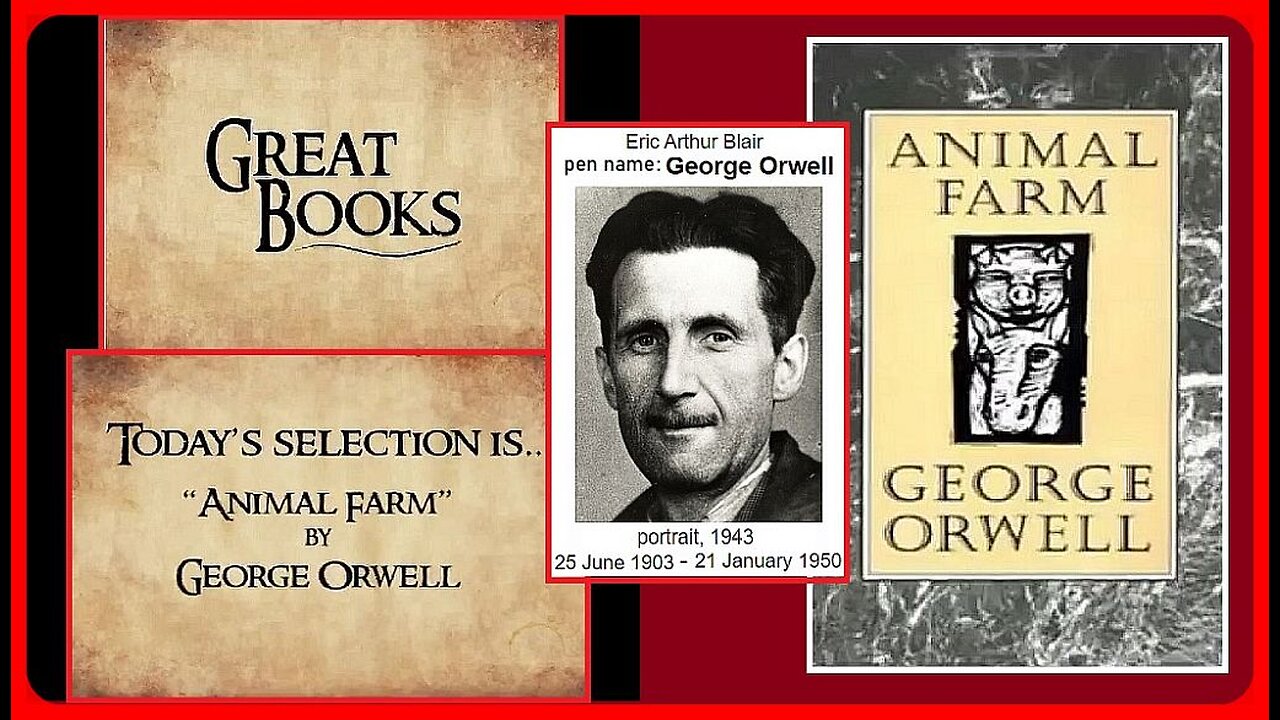Premium Only Content

📚 Great Books: 'Animal Farm' • Eric Arthur Blair (Pen Name): George Orwell (1903 -1950) • 🕞28m
Publication date 08 December 2014 • ( NCTV17 - Public Access TV, Naperville ) • Great Books: Animal Farm is a satirical allegorical novella, in the form of a beast fable, by George Orwell, first published in England on 17 August 1945. It tells the story of a group of anthropomorphic farm animals who rebel against their human farmer, hoping to create a society where the animals can be equal, free, and happy. Ultimately, the rebellion is betrayed, and under the dictatorship of a pig named Napoleon, the farm ends up in a state far worse than before.
According to Orwell, Animal Farm reflects events leading up to the Russian Revolution of 1917 and then on into the Stalinist era of the Soviet Union, a period when Russia lived under the communist ideology of Joseph Stalin. Orwell, a democratic socialist,[5] was a critic of Stalin and hostile to Moscow-directed Stalinism, an attitude that was critically shaped by his experiences during the Barcelona May Days conflicts between the POUM and Stalinist forces, during the Spanish Civil War. In a letter to Yvonne Davet, Orwell described Animal Farm as a satirical tale against Stalin ("un conte satirique contre Staline"), and in his essay, “Why I Write" (1946), wrote: "Animal Farm was the first book in which I tried, with full consciousness of what I was doing, to fuse political purpose and artistic purpose into one whole".
The original title of the novel was Animal Farm: A Fairy Story, but US publishers dropped the subtitle when it was published in 1946, and only one of the translations, during Orwell's lifetime, the Telugu version, kept it. Other title variations include subtitles like "A Satire" and "A Contemporary Satire". Orwell suggested the title Union des républiques socialistes animales for the French translation, which abbreviates to URSA, the Latin word for "bear,” a symbol of Russia. It also played on the French name of the Soviet Union, Union des républiques socialistes soviétiques.
Orwell wrote the book between November 1943 and February 1944, when the United Kingdom was in its wartime alliance with the Soviet Union against (Nazi) Germany and the British intelligentsia held Stalin in high esteem, a phenomenon Orwell hated. The manuscript was initially rejected by several British and American publishers, including one of Orwell's own, Victor Gollancz, which delayed its publication. It became a great commercial success when it did appear, as international relations and public opinion were transformed as the wartime alliance gave way to the Cold War.
Time magazine chose the book as one of the 100 best English-language novels (1923 to 2005); it also featured at number 31 on the Modern Library List of Best 20th-Century Novels, and number 46 on the BBC's The Big Read poll. It won a Retrospective Hugo Award in 1996 and is included in the Great Books of the Western World selection. ( 👉 https://en.wikipedia.org/wiki/Animal_Farm#Plot_summary )
—• About George Orwell: —— ( 👉 https://en.wikipedia.org/wiki/George_Orwell )
Eric Arthur Blair (25 June 1903 – 21 January 1950) was a British novelist, poet, essayist, journalist, and critic who wrote under the pen name of George Orwell, a name inspired by his favorite place River Orwell. His work is characterized by lucid prose, social criticism, opposition to all totalitarianism (i.e. both left-wing authoritarian communism and right-wing fascism), and support of democratic socialism.
Orwell is best known for his allegorical novella Animal Farm (1945) and the dystopian novel Nineteen Eighty-Four (1949), although his works also encompass literary criticism, poetry, fiction, and polemical journalism. His non-fiction works, including The Road to Wigan Pier (1937), documenting his experience of working-class life in the industrial north of England, and Homage to Catalonia (1938), an account of his experiences soldiering for the Republican faction of the Spanish Civil War (1936–1939), are as critically respected as his essays on politics, literature, language, and culture.
Orwell's work remains influential in popular culture and political culture, and the adjective "Orwellian"—describing totalitarian and authoritarian social practices—is part of the English language, like many of his neologisms, such as "Big Brother", "Thought Police", "Room 101", "Newspeak", "memory hole", "doublethink", and "thoughtcrime".[5][6] In 2008, The Times named Orwell the second-greatest British writer since 1945.
• Source: 👉 https://archive.org/details/Great_Books_-_Animal_Farm
——• ➤✝️ "Page Chronicles" Channel & Operator DISCLAIMERS
📌 I do not own the ©️ Copyright / Licensing to this content - but it's posted Under FAIR USE. (Education)
-
 1:06:25
1:06:25
Page Chronicles
2 days agoEMJ Live #112: A terrible day for American Jews • Dr. E. Michael Jones •🕞1h 6m
2321 -
 2:41:11
2:41:11
Canal Paulo Figueiredo
2 days agoPedro Valente Debunks The Myths of Jiu-Jitsu History
37.4K6 -
 2:01:46
2:01:46
vivafrei
8 hours agoEp. 254: China to Pay $24 BILLION? Who Owns Embryos? Tulsi was RIGHT on Syria! Prorogation & MORE!
139K110 -
 3:40:55
3:40:55
MyronGainesX
18 hours ago $15.42 earnedFormer Fed Explains Gabby Petito's Murder
69K24 -
 2:18:05
2:18:05
Nerdrotic
8 hours ago $8.29 earnedInvestigations into the Unknown with Micah Hanks | Forbidden Frontier #093
68.9K16 -
 18:54
18:54
The Rubin Report
12 hours agoHow One Woman Outsmarted Pornhub & Exposed Its Dark Secrets | Laila Mickelwait
146K122 -
 LIVE
LIVE
Major League Fishing
5 days agoLIVE! - Bass Pro Tour: Stage 3 - Day 4
939 watching -
 1:05:28
1:05:28
Sports Wars
15 hours agoLebron GOES OFF Over Bronny Hate, Pereira LOSES Belt To Ankalaev At UFC 313, Xavier Worthy Arrested
101K19 -
 10:27
10:27
Tactical Advisor
1 day agoDMR or SPR for Civilian Use?
99.4K6 -
 8:21
8:21
DEADBUGsays
1 day agoThe Crossbow Killer
94.7K22